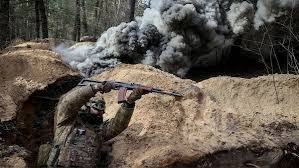
In recent developments, the United States has accused Russia of deploying the banned choking gas Chloropicrin during its military operations in Ukraine. This move, deemed a violation of the 1993 Chemical Weapons Convention (CWC), has sparked international concern and condemnation.
Chloropicrin, also known as nitrochloroform, is a chemical compound primarily used as an insecticide but was infamously weaponized during World War I. Its oily nature allows it to function as a toxic irritant, causing severe discomfort and harm upon exposure. Symptoms of Chloropicrin exposure include tearing and burning sensations in the eyes, skin irritation, and respiratory issues, including nausea and vomiting in cases of high concentration inhalation.
The US Department of State alleges that Russia utilized Chloropicrin as a riot control agent to dislodge Ukrainian soldiers from fortified positions, gaining tactical advantages on the battlefield. This accusation follows a pattern of Russia’s alleged use of chemical substances, including the poisoning of opposition figures like Alexi Navalny in 2020 and Sergei Skripal in 2018.
The Hague-based Organization for the Prohibition of Chemical Weapons (OPCW) prohibits the use and large-scale production of Chloropicrin, along with other chemical weapons, globally. The US has responded to these allegations by imposing sanctions on Russian state entities involved in chemical and biological weapons programs, including those facilitating the use of Chloropicrin against Ukrainian troops.
Both the US and Ukraine have raised concerns about Russia’s increasing reliance on riot control agents, such as tear gas grenades loaded with CS and CN gases, during military operations. This utilization of Chloropicrin is seen as part of a broader strategy that violates international agreements and norms.
In response to these accusations, Moscow has dismissed the claims as baseless and denied the use of Chloropicrin in its military operations in Ukraine. However, the international community continues to monitor the situation closely, emphasizing the need for adherence to established treaties and conventions regarding chemical weapons.
Sources By Agencies


